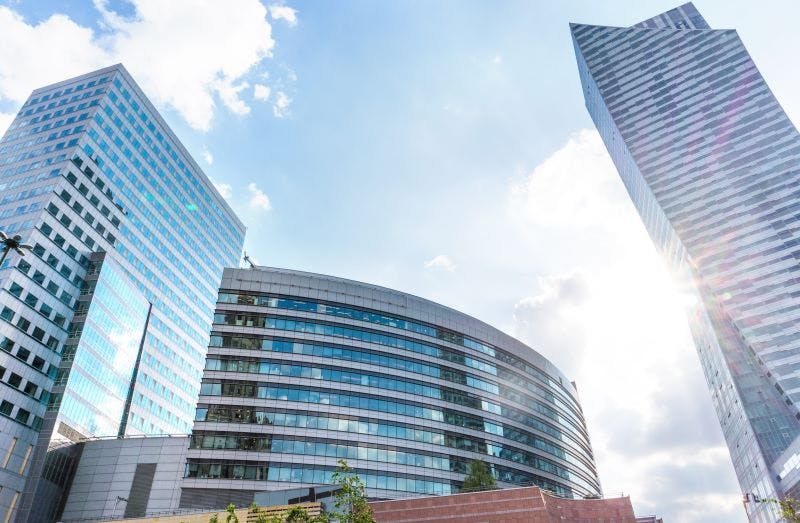Home


Resource Center
Owning a commercial property or acting as landlord for a rental property is a big responsibility. It requires maintaining building necessities and amenities with consistency. This includes ensuring reliable cell signal, which has become an absolute necessity today.
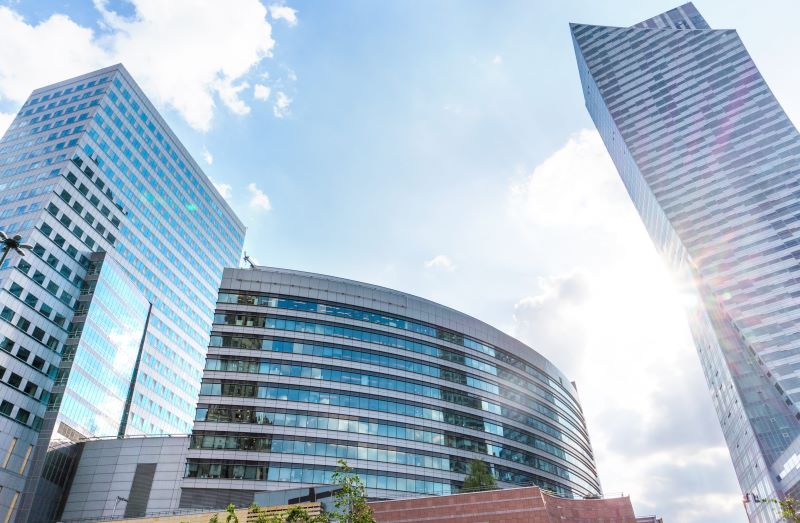
Unfortunately, property managers or owners often must deal with the problem of weak or low-quality signal. Some of the reasons for poor signal quality might be:
- Physical remoteness of a property from the cell tower
- Bad weather conditions
- Interference from construction materials or dense urban development
- A sudden glut of traffic on the carrier network
When you’re battling weak cell phone signal, the best solution is an in building cellular repeater system like those offered by WilsonPro. Find out how our solutions can improve cell signal in your commercial property.
How Cellular Repeaters for Rental and Commercial Buildings Work
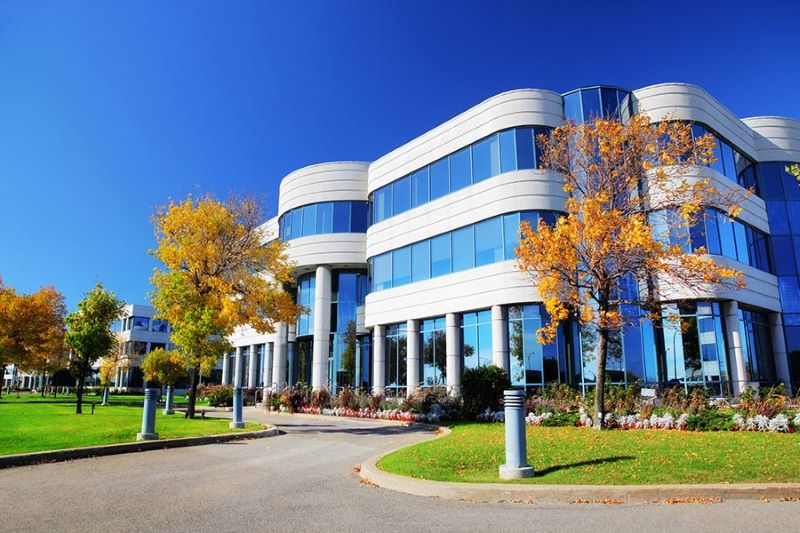
Cellular signal repeaters can operate in a wide range of work spaces. Their function is to provide reliable connections to cell phone networks for every mobile device and user in a building.
They work by bringing together three key components:
- An outside antenna, sometimes called a “donor” antenna
- An repeater or amplifier
- At least one inside antenna, but typically more in larger properties
The outside antenna captures a weak signal outside of the building. The repeater amplifies the strength of the signal. The inside antenna relays the enhanced cell signal through the inside of the structure. This model of cellular repeater technology is also called a passive distributed antenna system, or passive DAS.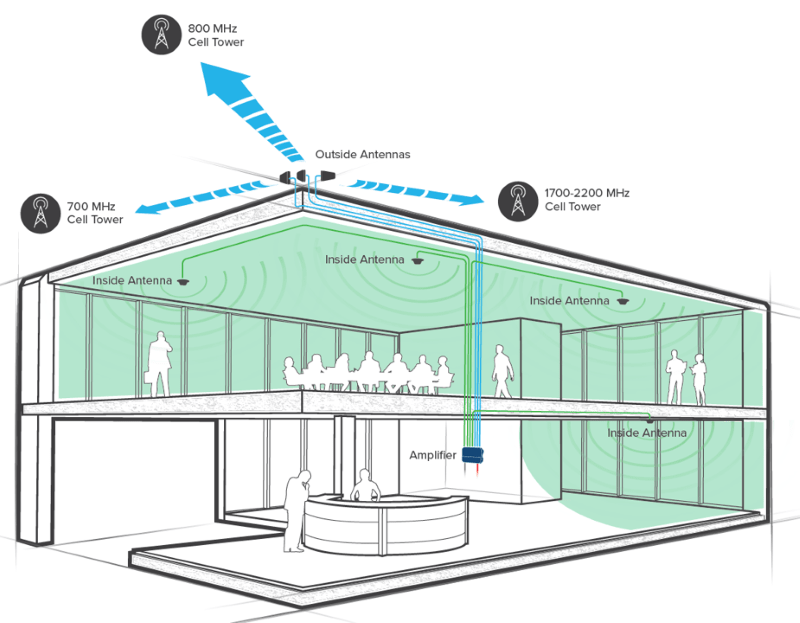
Any space with at least a weak cell signal available can benefit from a signal repeater. Commercial repeaters from WilsonPro can serve facilities upwards of 100,000 sq. ft. in size, and they don’t come with post-purchase recurring fees or the expenses and headaches of small cell networks. Thanks to a feature known as Multi Tower Targeting, many of our repeater systems work on every network and with all U.S. carriers, including Verizon, AT&T, T-Mobile, and UScellular.
The Benefits of Cellular Repeaters
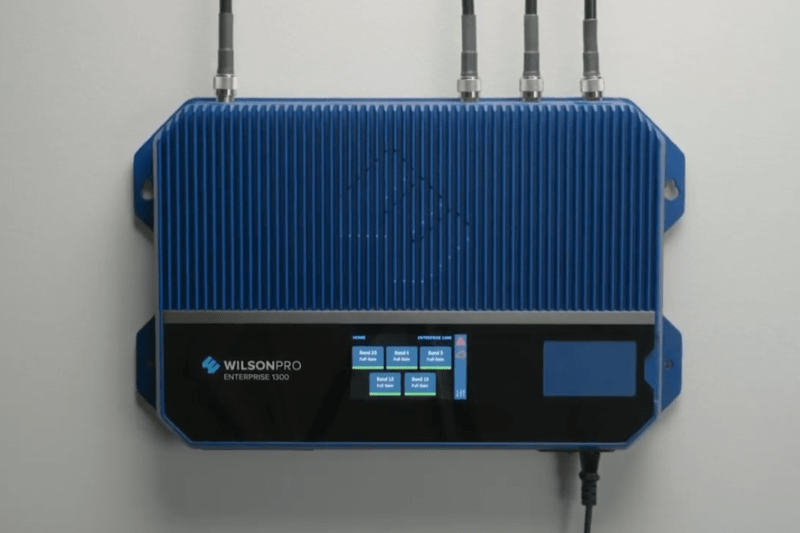
With a cellular repeater system in place, people in your commercial facility or rental property will enjoy all the benefits that come with reliable access to their mobile provider. This means fewer dropped calls, better voice quality, uninterrupted texts, faster data speeds, improved audio and video streaming, and greater hotspot capability. Not to mention, a stable connection to emergency services such as 911 and wireless emergency alerts (WEA), that can make all the difference in a crisis situation.
Stronger cell signal also makes for better power management. When cell signal is weak, a mobile device can waste battery power on futile attempts to chase intermittent connections. With the reliability of a cell signal repeater, users can enjoy longer battery life.
Above all else, for a commercial facility, consistent cell phone signal means the ability to connect quickly with teammates, customers, clients, suppliers, and visitors. Without reliable service, it’s a struggle to deliver the kind of customer experience today’s businesses depend on. And the inability to connect for simple operational conversations can prove distracting for your team and reduce their productivity.
You need to be able to anticipate and respond to the needs of all aspects of your business. That’s the peace of mind a connectivity solution from WilsonPro provides.
Choosing the Best Cellular Signal Repeater
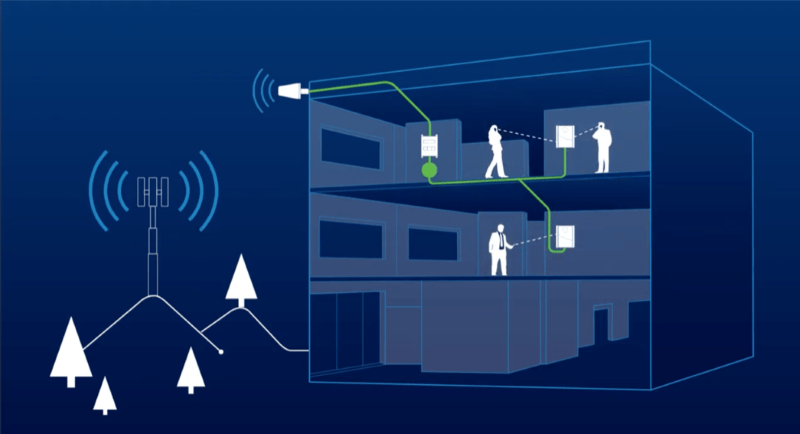
There are a range of pre-built signal repeaters on the market that can be used in commercial or rental settings, but there isn’t always a one-size-fits-all solution for a particular property’s cell signal problems.
That’s why it’s important to understand your needs upfront and customize the best solution to meet your requirements. Sometimes, the building materials that make for a “green” or eco-friendly building can block or degrade RF signals, for example. Or a building location in the middle of a dense city environment may be what’s causing the weak cell signal.
These kinds of customized passive DAS solutions take into account unpredictable factors that can complicate either acquiring or amplifying a signal. Sometimes, the building materials that make for a “green” or eco-friendly building can block or degrade RF signals. Sometimes, what’s otherwise a great location is also in the middle of a dense city environment that interferes with cell signal.
WilsonPro has solved these kinds of issues for major companies including Ikea, Microsoft, Best Buy, Whole Foods, and ExxonMobil, among others. To address each company’s particular requirements, WilsonPro works with integrators — companies trained to understand the technology and with installers certified in an advanced training course at the Wilson University Training Facility.
For any installation, the WilsonPro team will find the integrator and the custom design that best meets the specific challenges a company faces.
The Difference Between Cellular Repeaters and Small Cell Technology
The current rollout of 5G networks creates a pressing need for more network capacity. People are already using more mobile data than ever before, and with 5G, that trend is only going to increase.
Signal repeaters are one way to deal with that problem, but another option is becoming more popular: the small cell network. These networks employ low-powered antennas called nodes that operate like miniature cell phone towers. Nodes like femtocells and microcells can be used to extend the reach of mobile providers.
However, they do come with certain drawbacks:
- Limited carrier compatibility (femtocells and microcells have to be dedicated to one carrier)
- Small area of effect, usually one to two rooms
- Recurring monthly fees
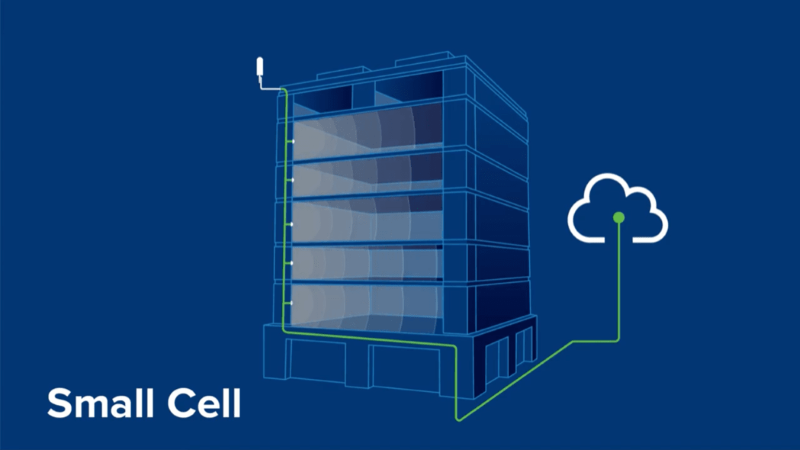
The monthly fees can increase the costs of a femtocell or microcell network rapidly. Small cell raises some other concerns as well.
- Clutter – Using small cell networks while preserving the aesthetics of a community can be a challenge. A random or pervasive clutter of small cell antennas can create confusion and bring down property values. A lot depends on the design acumen of your installer.
- Permits – Small cell networks can involve permitting headaches that cell signal repeaters simply don’t have to deal with.
- Safety – Concerns have been raised in some quarters about the kinds of radio frequency exposure that small cell networks involve and whether this could be a health concern. That conversation is ongoing, but companies dealing in small cell continue to reassure their customers that they’re operating well within current FCC safety limits.
Ultimately, the situation in which you’d most need to resort to a small cell network is when there’s simply no mobile signal in your area for a signal repeater to amplify. Short of that, signal repeaters are generally an equally effective and more cost-friendly way to go.
Get Started With WilsonPro Today
Dropped calls, poor service, and the headaches of interrupted communication can be a thing of the past in your commercial facilities and in your rental properties. Contact us today to learn more about how a custom cell signal repeater system from WilsonPro can make all the difference for your business.
